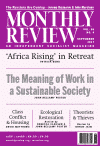Marxism

Benjamin’s philosophy presents problems best addressed not academically, but in dialogue with living political processes. And it is in Latin America, particularly Venezuela, that Benjamin’s ideas have been most vividly illustrated and interrogated. | more…

Women's Labor and Resistance in Eastern India
Neoliberal development has opened the eastern Indian state of Odisha to mining companies and steel conglomerates, threatening the region’s ancient subsistence economies and provoking a fierce resistance, in which women have taken a leading role. | more…

At their best, worker cooperatives are among the most effective examples of radical democracy in action. A recent vogue for cooperatives as high-tech entrepreneurial endeavors, however, seeks to expand rather than challenge the rule of market economics. | more…

As the smoke clears from the collapse of revolutionary societies from Eurasia to Central America, analysts are searching for the crucial points of weakness that led to the failure of these “socialist experiments.” In Gathering Rage, writer, poet, and activist Margaret Randall describes how two of these revolutions, in Nicaragua and in Cuba, addressed or failed to address a feminist agenda.
Writing as both observer and participant, Randall vividly describes how, in each case, to varying degrees, and in different ways, women’s issues were gradually pushed aside. Combining anecdotes with analysis, she shows how distorted visions of liberation and shortcomings in practice left a legacy that

The publication last month of The Age of Monopoly Capital: The Selected Correspondence of Paul A. Baran and Paul M. Sweezy, 1949–1964, edited by Nicholas Baran and John Bellamy Foster, constitutes a landmark for Monthly Review Press. A historical document in itself, The Age of Monopoly Capital is not simply about the writing of their magnum opus, but also provides a window onto an entire era of American life. | more…

The idea of total liberation from work, in its one-sidedness and incompleteness, is ultimately incompatible with a genuinely sustainable society. The real promise of a system of labor beyond capitalism rests not so much on its expansion of leisure time, but rather on its capacity to generate a new world of creative and collective work, controlled by the associated producers. | more…

The present Russia panic follows an entire century of fearmongering and “threat inflation,” dating to the Russian Revolution, that has long served the interests of the U.S. military-industrial complex and security state. It has had little to do with either Russian or American realities, which have been consistently distorted. | more…

Class Conflict and Public Housing in Britain
Class conflict, from both below and above, has long shaped the history of housing in Britain. These struggles continue today, as the ravages of neoliberalism have forced public housing once again onto the agenda in the United Kingdom. | more…

From 1972 to 1989, an obscure sect of Danish Maoists developed a unique synthesis of orthodox Marxism-Leninism, theories of imperialism and unequal exchange, and legal and illegal practice that distinguishes it from any other group then active in Europe or North America. | more…

Paul A. Baran and Paul M. Sweezy were two of the leading Marxist economists of the twentieth century. Their seminal work, Monopoly Capital: An Essay on the American Economic and Social Order, published in 1966, two years after Baran’s death, was in many respects the culmination of fifteen years of correspondence between the two, from 1949 to 1964. During those years, Baran, a professor of economics at Stanford, and Sweezy, a former professor of economics at Harvard, then co-editing Monthly Review in New York City, were separated by three thousand miles. Their intellectual collaboration required that they write letters to one another frequently and, in the years closer to 1964, almost daily. Their surviving correspondence consists of some one thousand letters. | more…

The fundamental humanist values of the Russian Revolution still capture the imagination. As an experience of history and a methodology for transforming the world into a community, the revolution’s legacy has persisted far beyond the failed experiment of state socialism itself. | more…

Left Intellectuals in Yugoslavia, 1988–90
Throughout Eastern Europe, there was an unleashing of pent-up questions, hopes, and fears brewing for decades. There was a sense that the ground was trembling underneath these experiments in socialism. It was clear to most of us that socialism could only survive through radical democratization. | more…











